#this isn't the only example but it's the earliest
Note
Do you happen to know the origin of the fantasy trope in which a deity's power directly corresponds to the number of their believers / the strength of their believers' faith?
I only know it from places like Discworld and DnD that I'm fairly confident are referencing some earlier source, but outside of Tinkerbell in Peter Pan, I can't think of of any specific work it might've come from, 20th-c fantasy really not being my wheelhouse.
Thank you!
That's an interesting question. In terms of immediate sources, I suspect, but cannot prove, that the trope's early appearances in both Dungeons & Dragons and Discworld are most immediately influenced by the oeuvre of Harlan Ellison – his best-known work on the topic, the short story collection Deathbird Stories, was published in 1975, which places it very slightly into the post-D&D era, though most of the stories it contains were published individually earlier – but Ellison certainly isn't the trope's originator. L Sprague de Camp and Fritz Leiber also play with the idea in various forms, as does Roger Zelazny, though only Zelazny's earliest work is properly pre-D&D.
Hm. Off the top of my head, the earliest piece of fantasy fiction I can think of that makes substantial use of the trope in its recognisably modern form is A E van Vogt's The Book of Ptath; it was first serialised in 1943, though no collected edition was published until 1947. I'm confident that someone who's more versed in early 20th Century speculative fiction than I am could push it back even earlier, though. Maybe one of this blog's better-read followers will chime in!
(Non-experts are welcome to offer examples as well, of course, but please double-check the publication date and make sure the work you have in mind was actually published prior to 1974.)
#gaming#tabletop roleplaying#tabletop rpgs#dungeons & dragons#d&d#tropes#media#literature#religion#death mention
4K notes
·
View notes
Text
Finding Deleted Fics: A Multi-Method Guide

i feel like we are the fandom who needs this post the most any fandom has needed it ever.
all of these methods require you to know the title, author and/or link of the fic.
[disclaimer: the fic i am using as an example is not deleted, i just can't think of any other fics to use as an example right now.]
Method #1: Wayback Machine
this is my go to method that i always try first.
steps:
every fic on ao3 has a url of archiveofourown.org/[specific-numbers]. you're gonna need that url, doesn't matter if it doesn't work anymore.
eg.

2. now you're gonna go to archive.org and enter your url in the search bar.
3. something like this will come up. it probably won't be saved as many times though, just once or twice.

just click any of the links now, either the dates marked blue on the calendar or the earliest/latest date. that's it.
drawbacks:
often, a problem arises when searching for fics rated mature or explicit.

the site will have archived this page but not the actual fic. though, maybe lady luck is on your side and clicking proceed will lead you to a saved version of the actual fic. but usually not. and not all fics are saved here. in those cases, i have some more methods.
Method #2: Search Engine Cache
search engines like google and yandex often save a cached version of sites, though yandex is much more reliable than google. i'll give you a tutorial for both.
steps (yandex):
the link isn't completely necessary, just the title and author of the fic will suffice.
go to yandex.com and search for your fic by either entering the url or entering the title and author as such.

3. this will probably immediately come up.
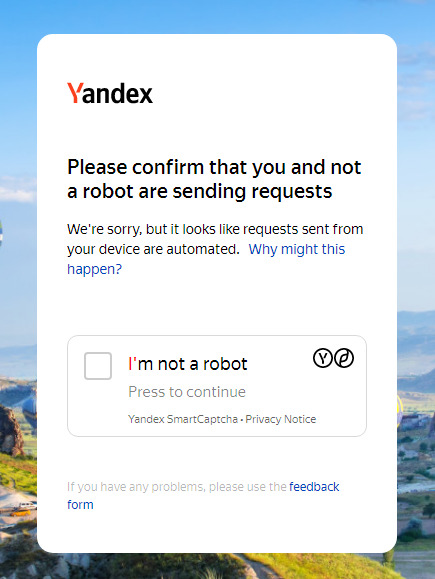
just enter the captcha and it should let you in on the first go but there's a glitch i've encountered where you could be entering the captcha completely correct but for some reason the site still won't let you in. for that, you just have to keep trying again and again until eventually the site lets you in. might take more than 10 tries.
4. once you're in, search results will pop up. directly clicking them will only lead you to the not found page. what you're gonna do is hover over the box of the search result and you'll see 3 dots pop up on the right.

click those and a dropdown menu will appear. click the first option 'saved copy'.
and thats it! this is a much more efficient method especially for explicit or mature fics.
drawbacks:
for some reason, when i open yandex in google chrome, i can't see the 3 dots. i can in firefox though. don't really know what thats all about.
i'll show you how to do it with google too just in case yandex doesn't work.
steps (google):
in the url bar, type cache:[link of fic]. that's pretty much it. google doesn't have a lot of fics saved though so you'll probably get a 404 page.
Method #3: Reddit
there's a subreddit called r/DeletedFanfiction that can probably help you out. either search for the fic as it may have already been posted or req it and someone will probably get you a google drive link soon enough. u/throwthisaway11112 is my lord and savior.
afaik it's still up and running fine despite the reddit protest thing (which i recommend taking a minute to look into).
Method #4: Archive.org Database
okay, now you're gonna need a lot of memory on computer for this one. i'm not gonna even bother and try to explain it, i'll just link you to the original post. thank you once again to the anon who sent me this method!
Method #5: Fandom
if absolutely none of those methods work, you can still just send me an ask and maybe my followers or i will have a saved copy. same for any other fandom, i recommend asking around in popular fandom spaces, someone is bound to have it.
#deleted fics#kay talks#save#ao3#internet archive#excuse my poor graphic designing#i wanted to add my photo thing#but this isnt a#fic rec#so i just slapped ao3 hacks on#decent imo#hope this helps someone out#ao3 hacks#how to ao3
1K notes
·
View notes
Text
so like obviously we the audience couldn't have known about the ghosts' deaths before the show introduced them to us, largely via alison as an audience surrogate. but the way they're presented so often means that they are mysteries to the ghosts themselves. some of them are pretty unmistakable and obviously the ghosts that were there when it happened know, but even then. it seems like they just don't talk about it.
for example, when fanny opens up about being pushed by george and thomas says "I did know that, I was there" but like. you never brought it up before? in the couple hundred years of knowing her, you never mentioned it. and in the thomas thorne affair, which is all about the ghosts having different perspectives on thomas' death, the information each of them reveal is like. new to the other ghosts. which implies that they've never really talked about it together before.
which is fascinating because it could read either as like. being respectful of their privacy. which is sweet. or you can believe the sadder version which is that they just didn't talk to each other. hundreds of years together and they never asked. they never said "do you want to talk about it?" they never offered comfort on a death day. never shared the details of their own deaths. this read is corroborated pretty solidly by the bone plot and pineapple day.
and then there's also the aspect of the order the deaths are revealed making perfect sense with each of the ghosts' personalities and openness as people.
pat is an open book, trusting and genuine, and his cause of death is unmistakable. and his death day flashback is the earliest in the series. humphrey's cause of death is obvious but the circumstances are not, but when asked he's willing to share. and then most of the ghosts stop listening when they think he's a hero. hesitant to initiate conversation because it was so drilled into him by sophie's disinterest, and forgotten as soon as he's not important. thomas believes in the most romantic version of his own story, editorializing and glamorizing his betrayal to alison and being devastated when the truth is pieced together, mirroring his constant attempt to make things more idealized than they are, and his rare and poignant moments of sincerity. kitty's naivety and optimism made her truly believe she just fell asleep, never bothering to question the details of her death, and the ghosts knew just enough about eleanor's bullying to suspect her, but would never confront kitty about it directly. her episode comes late in the series and has a lot of intrigue and staging for a very mundane truth. and the captain!!! the last death reveal of the show, holding on to his attempted deception and secrecy until the very end, trying to bolster his image as a leader to the other ghosts and only succeeding in looking silly, being made to perform a role he isn't very good at for the chance of acceptance. and oh, look at that, that's exactly how he died.
anyway, this post got away from me but like. the utter craft that went into this show astounds me it's all so perfect. are you hearing this.
#everyone watch bbc ghosts right now#maybe this should be two different posts#but i just love when the logistics of the show match the subject matter#THEMES! PARALLELS! IMAGERY! SYMBOLISM!#yknow!!!#bbc ghosts#ghost5#ghosts s5#ghosts spoilers
194 notes
·
View notes
Text
Been endlessly fascinated for a while now with a few scenes in Spy x Family which seem to hint at the fact that along with her Telepathy, Anya shows signs of having Empathy powers too. They don't happen often, but there are a number of times when Anya is shown to have a reaction to someone else experiencing intense emotions near her, which usually confuses, overwhelms, and frightens Anya.
One of the earliest examples of this we see is the apology between Damian and Anya, where Anya is shown reacting when Damian is struggling to bottle up his emerging emotions towards her;
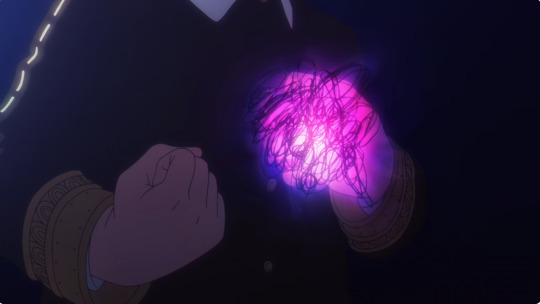

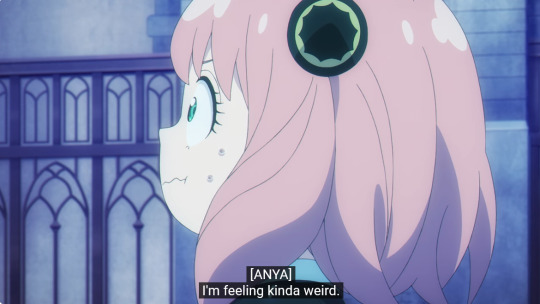
It's not Damian's thoughts that Anya's responding to here. It's his emotional state. It's pretty clear Anya has no idea what the hell is going on or what these emotions are since she is FIVE YEARS OLD and spent four of those five years isolated and studied in a lab and thus not interacting with other people beyond being a test subject, but she seems to sense Damian's feelings. This is a pretty big deal because while they are somewhat connected, thoughts and feelings are NOT the same. Thus Telepathy- the power to read minds- is not technically the same as Empathy- the power to sense another person's emotional state.
I don't think Anya's Empathy power is quite as strong or as clear cut as her Telepathy, though. Near as I can tell, she only seems to really get echos of especially intense emotions instead being able to get a read on people's emotional states any time she wants to like she does with their thoughts. I also don't think that she is fully aware that she has this ability, since she always seems confused when it does happen. We actually see this more clearly in the scene where she saved Ken from drowning in the hospital pool.
When Ken falls in the water, he isn't thinking anything at the time. He's in a state of fear and shock too overwhelming TO think, and Anya picks up on that from quite a distance away and freezes on the spot to look around to see where it is coming from, once again sensing the intense emotional state rather than hearing the thoughts formed in his head.

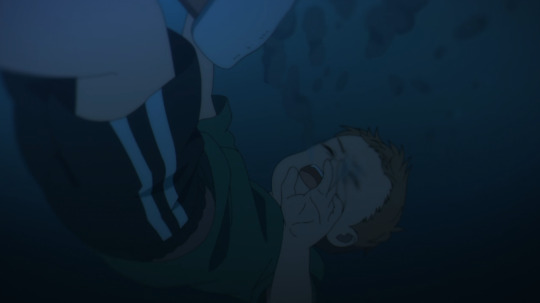




When Ken DOES finally start thinking, that's what gives Anya the information she needs to help him, but this only comes after his shock wears off and he begins to realize he is completely helpless.

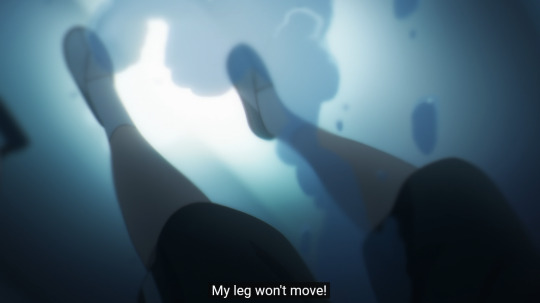
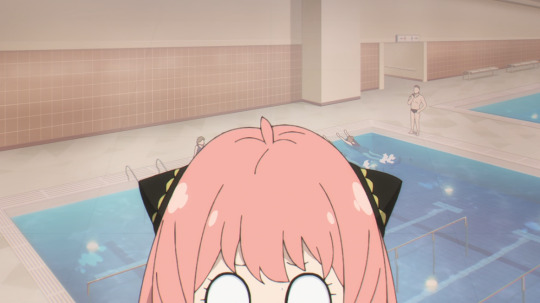

Being a child, Anya probably doesn't realize that thought and emotion are two different beasts, and that the fact that she is capable of sensing emotional states like this. The lab she grew up in seems like a cold, impassive environment where the scientists were all extremely detached from her, so this part of Anya's power was likely never known to them, and thus never explained to her the way her telepathy was. And I personally find this incredibly exciting, since it means there is potential for growth with Anya's powers.
Anya is extremely young. Her brain isn't anywhere near fully developed yet. It's entirely possible that as she gets older, her powers will continue to grow and develop as her brain does and she will be able to do more things she hadn't previously been able to before, and I find that possibility incredibly exciting.
102 notes
·
View notes
Text

We're so used to referring to Apollo and Artemis as Divine Twins, but did you know that the earliest known Ancient Greek sources do not explicitly denote the two as being twins?
That isn't to say one text depicting a myth is more correct than the other - but I so rarely see mentions of Apollo and Artemis as not twins that I find it all the more dear.
There is beauty in Solar and Lunar twins - but I also see the same beauty in siblings who are not predetermined to be each other's mirror by the fact of birth.
The first mention of Apollo's name in the Ancient Greek texts is in the Homeric Hymn to Apollo (3), trans. by Hugh G. Evelyn-White:

Here's a link to the original.
They are not explicitly called twins and They have different birthplaces: Apollo's birthplace is Delos, Cyclades - Artemis is born in a place named Ortygia. It should be stated that only Apollo's birth is given any sort of detail, and it is unclear where Ortygia was.
Ortygia (center of modern Syracuse named after the Greek word for quail) in Sicily has been known to Greek colonizers since around the 8th century BCE, Homeric Hymns date to approximately the 7th-6th century BCE. It's possible that Artemis was born there. In this case, the locations are separated by the Ionian sea and a large part of Greece. Delos is a small island to the North from Naxos and right at the Southern ridge of Mykonos, Ortygia in Italy is the Eastern part of Sicily:

Ortygia could also be attributed to a large number of other places. Strabo (63 BCE - 24 AD) in his Geography (10.5.5) stated that Ortygia is but an old name for Delos or for Rheneia, a small island in the Cyclades:
Rheneia is a desert isle within four stadia from Delos, and there the Delians bury their dead; for it is unlawful to bury, or even burn, a corpse in Delos itself, and it is unlawful even to keep a dog there. In earlier times it was called Ortygia.
Though earlier in the same book (6.2.4) he argues that Ortygia might also be in Sicily. He gives a detailed explanation of what we now know as the Old Town of Syracuse:
Ortygia is connected with the mainland, near which it lies, by a bridge, and has the fountain of Arethusa, which sends forth a river that empties immediately into the sea.
— The Geography of Strabo, Books 1-5 translated by Hamilton and Falconer
Ortygia is also a placename attested to different parts of Greece. For example, in Homer's Odyssey (5.123), a much earlier text, Artemis kills Orion in Ortygia and the place is not anyhow noted to be connected to Delos:
<...> until in Ortygia chaste golden-throned Artemis
attacked with her painless darts and killed him.
— The Odyssey of Homer, translated by James E. Huddleston
Hymn to Apollo is not the only Ancient text predating any mention of "twins" that did not specify that the two were born at the same time. Hymn to Artemis (27) calls the Gods a brother and a sister while Hymn to Artemis (9) indicates that They were raised together (ὁμότροφον) without a notion of the circumstances of Their birth. Those are the earliest sources we know of, but there were many other authors and traditions that followed, some of which were:
Homer in the Iliad makes Them a son and a daughter of Leto
Hesiod mentions them being born from the same mother
Neither describe the two as twins.
Apollodorus in his Bibliotheca (1.4.1.) makes Artemis be a first-born so She serves as a midwife for Apollo
Plutarch in Pelopidas states that Apollo was born in Tegyra, Boeotia
Some later sources (Callimachus, Servius) consider Artemis to be first-born while some (Hyginius) do not specify on time of birth.
The first - and most prominent - author to speak of the Divine Twins is Pindar (518-438 BCE) in his Olympian odes (3.35), here he refers to Them as twins of Leda. At the same time, in the Nemean odes (1.1) he calls Ortygia in Sicily Artemis' birthplace and "sister to Delos" (might be metaphorical, as in sister-state). Orphic Hymn 35 to Leto (1st-3rd AD?) also calls Them twins.
It should probably also be noted that the cult of Artemis and the cult of Apollo are not always interconnected. While some locations (such as Delos and Ortygia, Sicily) have a history of implementing both Deities into the same votive tradition, some (Didyma, Claros) have worship of the Gods completely disconnected from each other. It is likely worth another post, but worship of Apollo didn't necessarily imply His sister, and vice versa.
With all of this being said, I do not believe that one version of the story is above another. And while I do find it fascinating - and logical - that the idea of Apollo and Artemis being twin-Deities has taken root, I do appreciate other, older and not, versions of the same legend.
#HISTORIA 📔#I have an insane aesthetic rule with golden text but. I hope you can see underlined text; those are all links.#greek mythology#greek gods#artemis#apollo#artemis deity
98 notes
·
View notes
Text
Found a Hate Blog in The #Plural Tag. 😮💨
As I covered recently, "Plural" is an inclusive word with origins in endogenic and non-disordered systems.
If any anti-endo posts in the "#plural" tag or other inclusive tags, don't expect your DNIs to be respected.
They also are doing this knowingly. People have already tried to contact them about using the inclusive plural tag and the hate blog has stubbornly refused.

So if they're going to post in inclusive tags, I figured I might as well respond to some of their vent posts in anti-endo tags. As always, if anti-endos have a problem with this or feel boundaries are being unfairly crossed, please take it up with the hate blog I'm responding to that's invading our spaces.
Also, really weird how they just jump straight into saying "pro-endos" aren't systems either. Hate to break it to you, but there are a lot of traumagenic DID systems whose disorders and trauma are just valid as yours. And they manage to not be bigots too!
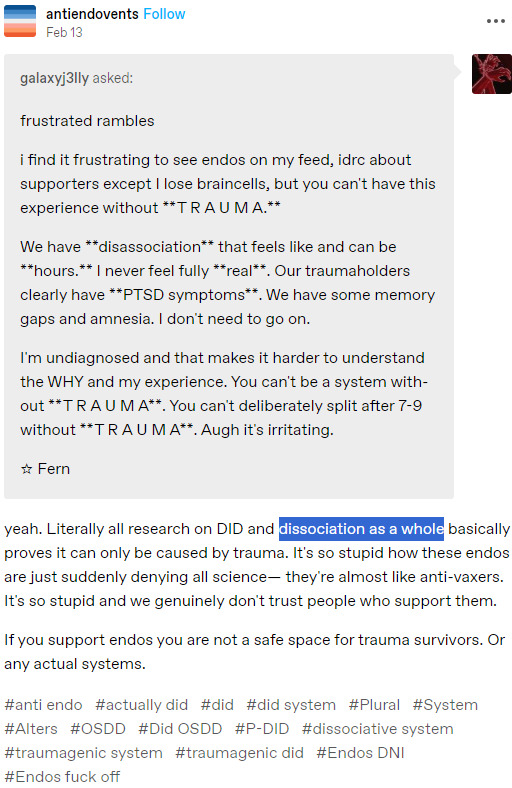
Wait... are they claiming that ALL dissociation can only be caused by trauma?
Although previous research has implicated a history of childhood trauma in the development of dissociative tendencies, insufficient cognizance (in this context) has been taken of the distinction between pathological and nonpathological dissociation. In this study, the relationship between childhood trauma and both pathological and nonpathological dissociation was investigated in a sample of 100 Australian adults. Pathological dissociation was positively predicted by dimensions of childhood trauma, but no such relationship was found for nonpathological dissociation (psychological absorption). The data are consistent with the traumagenic model of the dissociative disorders, but factors other than childhood trauma may also be pertinent.
Amazing how they compare us with anti-vaxxers while trying to claim all dissociation is traumagenic. This wasn't even hard to find. 🙄
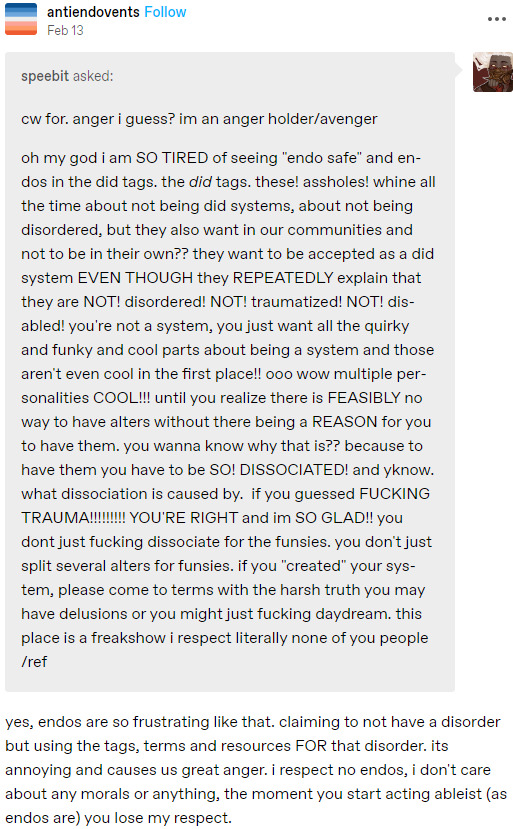
"I don't care about any morals"
Well, at least you're up front about it.
Also, I tend to check the DID tags every now and then and you know what I don't see there? Endogenic systems!
"#Endo Safe" tags are more often than not used by pro-endo traumagenic systems.
Guess what! If you have DID, you get to post in the DID tags. Being a hateful bigot isn't a requirement! Anyone with DID has the right to post in the DID tags, and can tag their post as endo safe too!

Maybe you wouldn't get as many anons from endogenic systems if you stop posting in inclusive tags. Just a thought!
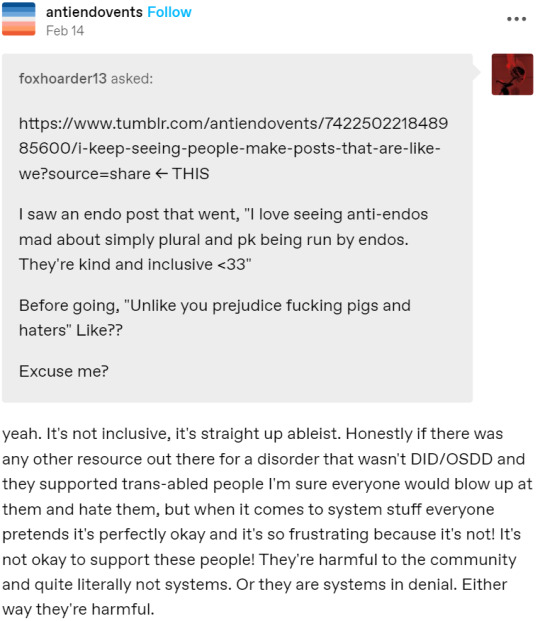
How are they harmful to the community again?
Weren't you just saying earlier that pro-endos were stealing resources? Now you're acknowledging that they're making resources for the community, but this is also bad?
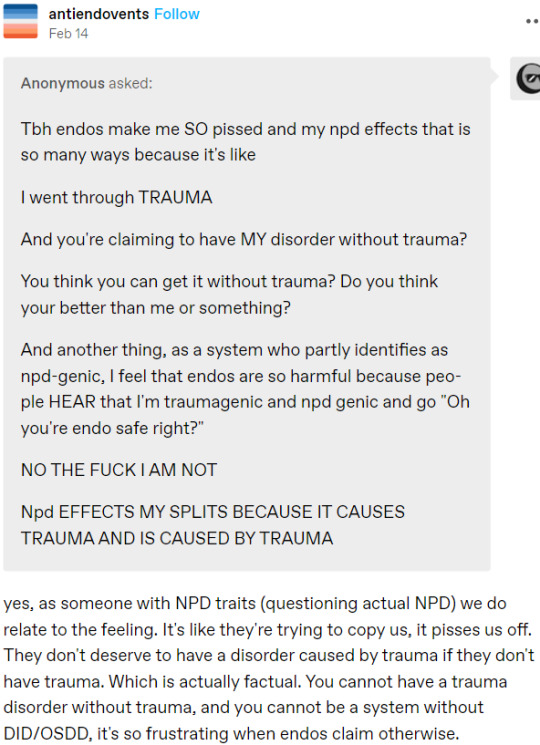
LOL!
Genic labels literally only exist because of the pro-endo community. And the anti-endo community notoriously hates xeno-origins like NPD-genic. Yes, people will assume you're endo-safe when you use xeno-origins because these terms, like most resources in the plural community, were made by pro-endos.
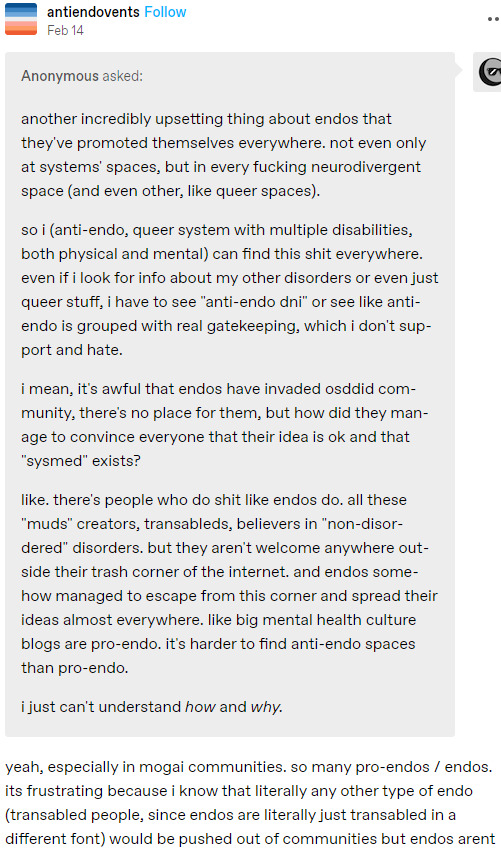
Keep it up guys! It's working! We're spreading!
Sorry, I don't feel like rebutting anything here. I just appreciate seeing that our efforts are paying off!
The Future is Plural! 😁

Stop!
This talking point has been completely debunked.
System hopping was used by pro-endos 15 years before the earliest association with RAMCOA. The idea that it was a RAMCOA term is a total lie invented by anti-endos!

OSDD-1A and OSDD-1B are not actually official disorders. There is an OSDD. The first example, called OSDD-1 sometimes, gives two possible presentations. One with less distinct alters and amnesia, and another with no amnesia. But these aren't called OSDD-1a or OSDD-1b.
If your goal is education, this nuance is important.

Could it be because ASPEC people have dealt with a ton of exclusionism from some queer communities, and are more accepting of other people as a result? And perhaps they also recognize similarities between system exclusionists and queer exclusionists?
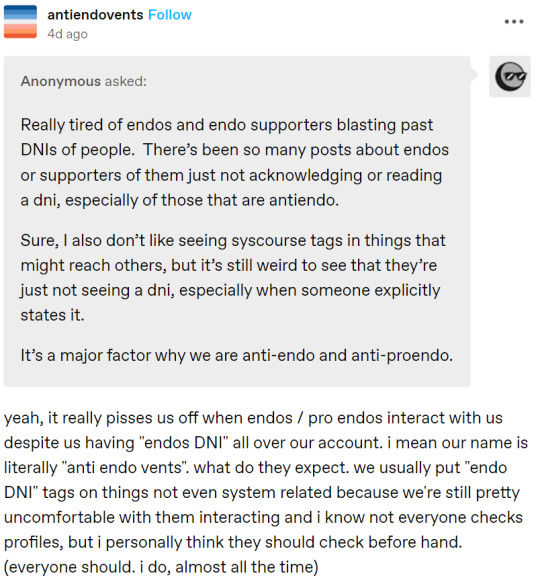
You're coming and posting in our tags!
That's why people keep interacting with you! "Plural" is a term coined by non-disordered systems, you've been told this, and you insist on posting in inclusive tags anyway!
You don't get to bust in someone's door, complain about them in their home, and then tell them not to interact with you! It doesn't work like that!
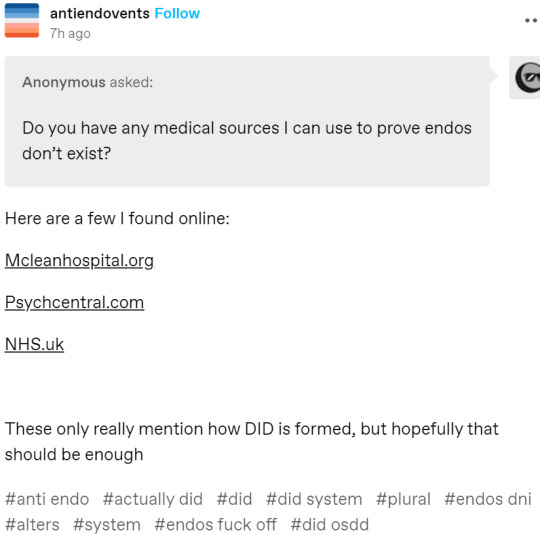
Funny how these are the only sources they can provide. And they exclusively deal with DID without even touching on other forms of plurality.
Anyway...
The ICD-11 says you can experience "multiple distinct personality states" without a dissociative disorder.
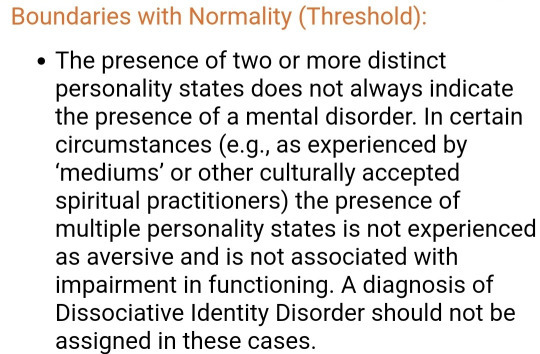
The creators of the theory of structural dissociation have said hypnosis and mediumship may involve self-conscious dissociative parts of the personality.
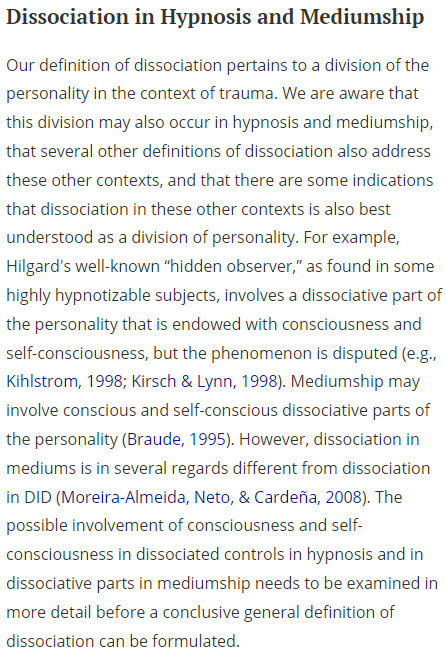
And Transgender Mental Health, written by Eric Yarbrough and published by the American Psychiatric Association (who publishes the DSM) says you can be plural without trauma or a disorder.
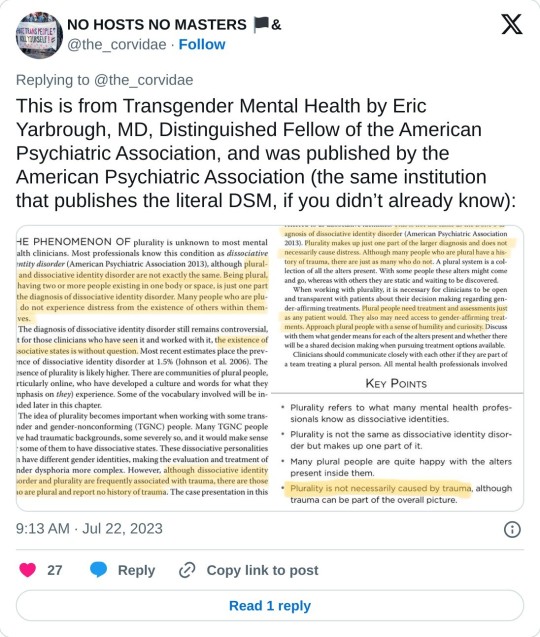
Sources repeatedly affirm that it's possible to be plural without trauma!
Anyone who claims it's impossible to be plural without trauma is either ignorant or lying.
And if you're going to keep spreading hate and misinformation, at least keep it out of inclusive tags!
73 notes
·
View notes
Text
I remember reading a good post on here a year or two -- which I'm afraid I've been unable to track down again -- which pointed out that the Buffy writers' retroactive creation of a central coordinating "Watcher's Council" in Season 3 makes the fact Kendra wasn't expecting to meet Buffy when she visited Sunnydale in Season 2 rather strange. Surely Giles would have been sending in reports about Buffy's vampire-slaying to the Council, and surely the Council would have passed these on to Kendra's Watcher when he became worried that something bad was about to happen in Sunnydale. The post suggested as an explanation the theory that, after Buffy died and Kendra was activated as a Slayer, the Council just assumed Giles was coping really badly with losing his Slayer and dismissed all of his follow-up reports about her out of hand as a sad delusional fantasy.
In the same spirit, I'd like to propose that the fact Faith clearly is expecting to meet Buffy when she arrives in Sunnydale in Season 3 suggests that, inverting the pattern above, Giles has been lying to the Council about Buffy all summer and pretending that she's still in town doing her duty as a Slayer (and that he isn't spending all his time flying around the country desperately trying to find her).
This gets a bit long, but bear with me.
Faith knows about Buffy and she's heard at least a few stories about her (she calls her "infamous" and asks: "so, B, did you really use a rocket launcher one time?"). Faith can only have heard about past Slayers from her Watcher, who must ultimately (indirectly) have heard any details about Buffy through Giles sending reports back to the Council.
But Faith isn't just aware of Buffy as some abstract former Slayer. She comes to Sunnydale looking for her ("you're ... uh, Buffy, right? [...] I figured this was my chance to meet [you]") and, I suspect, deliberately arranged her fight with a vampire at the Bronze to make this happen (in particular she only seems to start fighting back once she has an audience...). Why didn't she head to Jamacia in search of Kendra? Well, clearly her Watcher must have told her that Buffy Summers was alive and that it was Kendra's death, not Buffy's, that had led to her being called. (Clutching at straws, but if you go back and watch the episode, Faith does nod slightly when Cordelia talks about Kendra dying; maybe her Watcher told her a bit about Kendra too?)
But how could Faith's Watcher (or anybody else), knowing that Faith has just been called as a Slayer, be sure which of the two previously alive Slayers had just died? (The show later retcons that only Kendra's death would have called a new Slayer, and Buffy's wouldn't, but I don't believe the writers had decided this was the plan before the end of Season 5's The Gift. The Mayor doesn't seem to think this is how it works, for example, and there are some things the writers said at the time that seem to rule it out too. But even if that was always what would have happened, if two Slayers at a time is unprecedented, as the show suggests, how could the Council be sure?)
The simplest answer must be that somebody told them that Kendra died. "Somebody" being, of course, Giles. But when did he tell them? The earliest he could have done it was at the end of the Becoming two-parter (Kendra dies in part one, but Giles is a prisoner for most of the following episode and I doubt Angel was letting him mail postcards back to England).
But the end of Becoming is also the point where Buffy leaves town and goes into hiding for months. Any report that Giles sent the Council from this point should have mentioned this, surely? The Council have all sorts of resources that they could have used to find her. It didn't have to be just Giles himself haring off after every false lead. But apparently, it was.
So, I think Giles wrote to the Council after Kendra died to let Sam Zabuto know and (whether actively or through omission) just ... let them think Buffy was still in Sunnydale. And then when it was time to send his next report in, he just ... kept pretending Buffy was still in town. Once he failed to tell them she was gone, he could hardly admit that she'd actually vanished weeks ago, could he? The Council generally have a pretty hands-off management style, but I don't think they'd have kept paying him if they realized he didn't actually know where his Slayer was or what she was up to. They might have decided earlier than in canon that he wasn't up to the job and needed to be replaced. Or even that this technically made Buffy a "rogue Slayer" who was refusing to follow her Watcher's orders. I think it makes sense he wouldn't tell them.
Which is why, over the summer, Faith's Watcher was telling her stories about Buffy Summers, the Slayer with a rocket launcher, stories which made Faith think she was living and Slaying in Sunnydale. Even though, for most -- maybe all -- of the summer Faith spent with her first Watcher, Buffy wasn't in Sunnydale at all.
(The show's a little bit vague about how much time passes between the start of Dead Man's Party and Faith's arrival in Faith, Hope & Trick but I don't think it's credible that it was enough time for Giles to be reunited with Buffy, for him to tell the Council she was back (and them to believe him), for the Council to tell Faith's Watcher, for Faith's Watcher to tell her, for Kakistos to murder Faith's Watcher and for Faith to flee Boston and travel over 3000 miles to Sunnydale through whatever combination of hitchhiking, freighthopping and motor vehicle theft she's meant to have used to make it there (she can barely cover the costs of the cheapest motel in Sunnydale: I don't exactly think she could afford a cross-country flight). When Giles gets through to the Watcher's retreat in England, enough time has passed for them to have found out about and confirmed Faith's Watcher was dead, and that can't have been quick either: Faith wasn't exactly rushing to tell them.)
So, all in all, Faith is pretty lucky she arrived in Sunnydale when she did. A few days earlier, and she'd have missed Buffy entirely. Maybe eventually one of her attempts to stage a fight so she could look cool in front of another Slayer would lead her into meeting the Scoobies and Giles and figuring out what was going on, but maybe not. Maybe Kakistos would have caught up with her first.
And, even if it's not intended, I like the symmetry of Kendra not knowing Buffy would be in Sunnydale (because Giles truthfully told the Council she was and they didn't believe him), versus Faith going to Sunnydale specifically to meet Buffy not knowing she might not even be there (because this time the Council did believe Giles but this time he was lying to them).
#btvs#I wish Faith's Watcher had a canon name so I could stop typing 'Faith's Watcher'#maybe I'll just pretend 'Diana Dormer' is canon after all
39 notes
·
View notes
Text
No, Ncuti Gatwa's Casting Isn't Regressive
Chapter 1 - For Black Boys?
The general consensus of male companions is they don’t really stand out like their female peers. If I said ‘iconic male companion’ I doubt many people would think of Adric. However, some are still loved by certain parts of fandom regardless. Rory’s nerdiness turned bravery has gotten him a small stanbase. Captain Jack is loved by many especially as he was an openly bisexual character, being Nuwho’s earliest example of queer representation. Or Wilf, whose light-hearted personality and humour engaged so many (Rest in Peace Bernard Cribbins). Black male companions on the other hand didn’t really get those types of flowers, let alone reaching Clara Oswald or Rose Tyler levels of popularity. The amount of lead Black men in Who is little (3 to be exact) and from them, their stories didn’t reach the icon status of the other companions of the show. And the reasons why unfortunately weren’t that surprising.
The first Black male companion was Mickey Smith. Mickey played the role of the scared boyfriend of Rose Tyler, simping after her as she ran off with a mysterious Ninth Doctor. Nine’s best-of-the-best mentality meant there wasn’t a Mickey shape in the TARDIS to fill in. The two would constantly have nitpicky back and forths putting Rose in the position of having to ‘choose’ her man. But her mind was made up. Rose and Mickey split by the end of the season with Mickey revealing his fling with a Ms Trisha Delaney. It wasn’t a universe-defying breakup where the galaxies tried to separate them but instead a case of two people with different wants and needs calling it quits. That doesn't sound too bad on paper, right? But unfortunately, RTD gave Mickey Smith a pre-Martha Jones arc, where so much of his arc would be dedicated to his failure to live up to a Rose Tyler standard. Despite Rose’s contributions to the RoseMickey split and how both characters had cheated on the other, both RTD and the fandom had given Mickey most of the blame. Mickey’s relationship with NineRose would eventually warm up towards the end of series 1, agreeing with Nine that Rose travelling was what she wanted and her council estate days were over. Series 2 decided to flip this on its head however, having Ten and Mickey being a lot more hostile towards each other. From Rose’s eyerolls to Ten forgetting Mickey’s existence it was clear the TenRose TARDIS team only had room for two. After getting fed up with his Tin Dog treatment, Mickey decided to stay in Pete’s World a little longer. The last of his official arc would be his return in the series 2 finale, gun-slinging against Daleks and Cybermen. He wouldn’t return until series 4 for the 2008 Dalek Invasion and a cameo with Martha Jones announcing their offscreen marriage. Although creating a small Mickey Smith standom, Mickey’s time in RTD1 was rough. He was mainly reduced to a comic relief or punching bag for the main white characters, having little room for his own developments. And the ones he did have, such as his absentee father, dead grandma and random Martha marriage were brief moments and not really enough to fully flesh him out.

Moffat gave us another Black male lead in Danny Pink. Although not a companion, Danny would be the math teaching counterpart to Clara Oswald and his conflict with TwelveClara would actually serve a narrative purpose. Unlike RoseMickey, our main companion would choose her boyfriend over the moody Time Lord although it was only briefly. Danny’s soldier past would have him demonised both in show and fandom, from Twelve’s bias against soldiers to Clara’s uncertainty to many TwelveClaras keeping him at arm's length and even going as far as to call him abusive. Danny, like Mickey, wasn’t super popular Black male representation either. Just as Nine and Ten made it clear Mickey wasn’t welcome, Twelve’s issue with ‘PE’ made it clear the two weren’t besties either. Danny would have to prove to Twelve he was worthy of Clara’s love and this would be achieved through his cyber-self sacrifice in the series 8 finale. Obviously, a child murderer would not be a fan favourite overnight, especially from the POV of a former solder Time Lord who’d suffered the consequences of war himself. However, series 8 established Twelve’s arc of moral ambiguity and potential for change, where he’d go on to question the type of man he was; good, bad, both or neither. Yet, Danny Pink was irredeemable. Whether we personally believe Danny deserved a second chance or not, he wasn’t given one like his white counterparts. To the fandom, Twelve and Clara’s actions were the byproduct of context and factors, heart-wrenching decisions in situations they couldn’t control. But Danny Pink was irredeemable, evil and the worst character of Moffat Who. Twelve and Clara were compelling. Danny Pink was trash. In fact, Missy, who’d claimed more lives than Mr Pink ever did would be set up for her own moral ambiguity arc, taking the iconic Time Lord villain and questioning if they could ever become good in their first female incarnation. Against a narrative of growth and change, a white woman’s redemption would be set up for a greater arc that would end at the end of Moffat’s run itself, with most fans supporting her growth and potential, whilst a Black man’s was found in his death to protect the other white characters. Danny’s final appearance would be in Last Christmas where he and Clara shared their final goodbyes. TwelveClara’s arc would continue in series 9 and Danny’s name was never mentioned again.
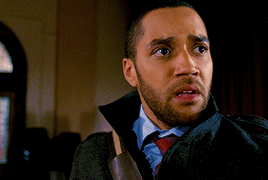
Chibnall introduced us to the first Black male companion to travel full-time, Ryan Sinclair. Despite this achievement, Ryan would somehow have even less visibility than Danny and Mickey. Ryan’s arc was simpler, focusing on his ability to ride a bike with his dyspraxia. He wouldn’t achieve this goal, not as a slight but as a small commentary on how disability wasn't something to be fixed and instead a part of people’s everyday lives. Ryan’s dyspraxia was heavily critiqued for being written inconsistently and so would many other aspects of his character. His missing YouTube channel post-series 11, his way of mentioning his dead nan each episode and his relationship (or lack thereof) with his dad were seen as many misses in the writing department. Even after losing his nan, most gun-wrenching heartfelt moments about her death were given to Graham instead. Along with this, there was and still is harsh criticism of Tosin Cole’s acting (which ironically hasn’t stopped him from securing lead roles in House Party and Supacell, making him a breakout star of the Chibnall era). Series 12 wouldn’t help Ryan’s case either as after the initial Tim Shaw storyline ended with Graham and Ryan finding a type of closure for Grace, Ryan would slip further back in the queue for priority characters. With the return and new incarnation of the Master, the Fugitive Doctor reveal, the Timeless Child, Ashad the Lone Cyberman and the hunt for the Cyberium, there wasn’t really room for a new companion arc for any of the fam, let alone Ryan specifically. At most, he got a small subplot involving shooting a basketball hoop, similar to his bike-riding storyline. This would only be relevant in two episodes; its introduction and a small scene of him teaming up with Ko Sharmus to take out some Cybermen. His dad whom we were introduced to in series 11 wouldn’t return in this series either, missing the opportunity for a follow-up from that storyline. Instead, we got Tibo, similar to Amy and Rory’s Mels, a companion’s alleged best friend who we never saw in the previous season. This friendship wouldn’t play a key role either and Tibo was reduced to irregular small appearances. Ryan would be ready to leave in Revolution of the Daleks with a wallet of psychic paper. No new YouTube video or completed mechanic NVQ in sight. The Chibnall era companions already faced a fair share of unpopularity and plenty of ‘cardboard cut-out’ allegations. In most companion polls, Ryan tends to sit at the bottom with his grandad Graham following close behind.
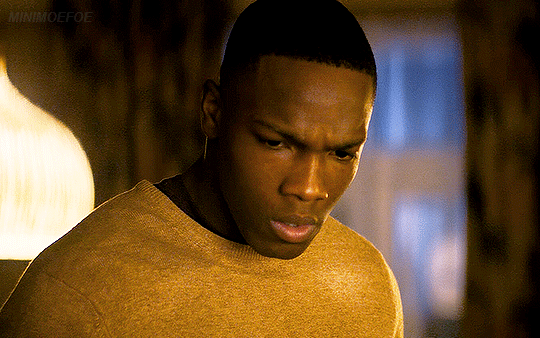
This isn’t to say Mickey, Danny or Ryan are blips in Doctor Who’s universe and had no impact whatsoever but that they all suffered due to a lack of meaningful writing. Mickey and Danny mainly served to facilitate white characters and many of their scenes functioned as reminders of how much the Doctor hated them. Ryan on the other hand, despite having what was supposed to be his own arc as a full-time companion, had to share screentime with two others on top of Thirteen’s arc as well. Thirteen and Yaz’s narratives stretched across three series whilst he only got two, and those two were already packed with a lot of other narratives. In the same way the treatment of Martha and Bill reflects the show’s issues in representing Black women, the treatment of these characters shows the issue in the show’s representations of Black men. The vulnerabilities of Black manhood are rarely portrayed in mainstream media due to the stereotypes of Black men being tough, aggressive and hypermasculine (key examples being the Black Brute trope or Thug trope). Even though I wouldn’t argue Mickey, Danny or Ryan fit these tropes exactly, their treatment reflects the antiblackness Black men experience; the false idea of inevitable struggle that Black men are supposed to ‘handle’ because of their ‘inherent’ strength. Across genders, Black characters are made to feel like they have to ‘work’ and ‘earn’ their spot in the TARDIS or ‘work’ to be worthy of the Doctor’s attention, which can feel like a barrier when it comes to feeling represented by this show. The Fugitive Doctor was a step forward, moving beyond Black characters as the companions but an attempt at a Black doctor, a Black main character. But with the Fugitive reduced to cameo roles and the end of the Chibnall era, this never came through. The main options seem to be Tin Dog or three seconds of screen time. Gatwa’s casting can not only be an attempt to build from the sidelining of the Fugitive but also provide a form of Black male representation the show has never done before, building on the neglect of Mickey, Danny and Ryan. The only way to move when you’re stuck at the bottom is upwards.
<- Intro
Chapter 2 ->
#mickey smith#ryan sinclair#danny pink#fifteenth doctor#15th doctor#ncuti gatwa#doctor who#new who#black representation#doctor who analysis#fandom analysis#doctor who fandom#fandom antiblackness#fandom racism#fandom history#rtd critical#moffat critical#chibnall critical
41 notes
·
View notes
Note
I feel like a recent years have shown that fan reaction has influenced the way Sega handles Sonic in some ways. Frontiers for example in a lot of ways feels like a reaction to complain. So a lot of fans have had about mainline Sonic games.
With that said what do you think about Sega making a multi-character 3D action game Sonic and then slapping it on a platform that has some of the least amount of player reach despite being a mainline platform?
I would be very curious to know more about the development behind Dream Team for sure, but as far as I'm aware the game was more than likely made specifically for Apple Arcade from the very start with heavy involvement from Apple, rather than being a project Sega was shopping around that just so happened to end up as an Apple exclusive.
I have to assume that this game would not exist at all if it wasn't an Apple Arcade project. Hardlight is very much Sega's mobile game division first and foremost, so it's unlikely (if not impossible) that Sega would've had them working on a 3D Sonic platformer for consoles and PC when that's Sonic Team's job. And Apple Arcade's subscription revenue is basically the only home for mobile games that aren't chock full of ads, microtransactions, and wait timers these days. So while it could theoretically get ported elsewhere in the future, it's unlikely that Dream Team ever would've gotten made for any other platform.
Like, there are already two Sonic games on Apple Arcade. Sonic Racing (based off of TSR) was one of the earliest releases for the service and has always been heavily promoted as one of Apple Arcade's flagship games. Later they also did Sonic Dash+, a version of the existing endless runner game with the ads and microtransactions stripped out. I have to assume that these games have done well on Apple Arcade, and Apple simply looked at that and went "Hey, what if we got them to make us an ORIGINAL Sonic game?" Apple Arcade also appeals pretty heavily to parents who want their kids to have something to play on their iPads that isn't cram full of microtransactions, and Sonic remains extremely popular with kids.
But beyond that, why they landed on a full 3D platformer with SIX playable characters, some amount of story, and a new style of level design that takes some influence from skate parks? Who knows. Maybe some folks at Sega Hardlight were just dying to make something like that, and the Apple gig was their opportunity to make it happen after so many years being stuck working on glorified Skinner boxes. Or maybe Apple thought a 3D platformer would be good to diversify their portfolio. Again, I'd be very curious to learn more
(Also, honestly, as annoyed as I am that I have to play Dream Team on my iPad instead of my PC or a console, I do find the talking point that "no one will be able to play it" extremely silly. There are billions of iPhones, iPads, Mac computers, and to a lesser extent Apple TVs out there. Billions. With a B. Apple Arcade reportedly had over 100 million users last year. That's quadruple the number of subscribers Game Pass had, even though if you asked the average gamer they'd probably assume Game Pass was the more popular one! Exclusivity is always frustrating, and I sympathize with folks annoyed that they don't have any devices that can play it, but the fandom deciding that "only six people will be able to play this" is completely divorced from reality.)
76 notes
·
View notes
Text
You should watch Pokemon Horizons
You should watch Pokemon Horizons. No seriously. You should watch the most recent Pokemon anime. Obviously people have different tastes and a children's anime isn't going to be everyone's cup of tea. But if you've ever enjoyed Pokemon, or are a fan of children's cartoons (particularly children's anime), I have to recommend trying Pokemon Horizons. Pokemon Horizons isn't finished yet, at 25 episodes, so there is always time for it to take a turn, but it has just completed its first arc "Liko and Roy's Departure", so I feel confident in recommending it. And with the English dub coming out soon (hopefully), bringing availability to a wider audience so whenever you get the chance, I’d recommend it.
Our main protagonist is Liko. And I don't want to define her by her predecessor, but she really is Ash's antithesis in the best of ways. Nothing against Ash, it’s just a change was necessary. Ash is a hot-headed, straight-forward, confident, extroverted. Liko is an anxious introvert. She's unsure of her identity, and what she really wants to do at first. You could say she's a lot like previous female Pokemon protagonists in that regard; though it's too early to make any conclusive statements about where she's going, I will say I think her particular flavor of self-discovering protagonist hasn't quite been fully utilized. To be brief, I think she's less focused on figuring out her dream, and more on figuring out what she wants next, in a step by step fashion. She’s learning to understand and prioritize what she really wants, not what she thinks she should do. One of the earliest bits we get in the series is her grandmother telling her the importance of that first step, and so as Liko continues to grow in tiny steps, and makes more of her own decisions it feels like growth. Liko is most charming for who she shows herself to be when she stops thinking. Stops hesitating and worrying about doing the right thing. Someone who jumps off buildings. Who charges into battle because it's the right thing to do. We are often treated to Liko's internal dialogue. Where we hear the thoughts she doesn't say aloud due to her more introverted nature. She often expresses her anxiety, her surprise when she does something rash or when something weird happens to her. Which makes her moments of strength all the better, as she grows into a strong trainer, who more easily and more deliberately makes decisions about her future. Also, despite not actively thinking about it as much, Liko does figure out what she wants. And without spoiling it, she’s more like Ash than it may seem at first.
Liko also is in the center of a minor chosen one narrative, possessing a mysterious pendant inherited from her grandmother (and it's suggested she may be descended from an ancient hero), with a power that only Liko can unlock. (Side note: we haven’t gotten too much of her grandmother yet, but she is just a fantastic example of a badass old lady). That may not necessarily be appealing to many people, but it’s a great catalyst for her growth and a justification for her to be getting involved in bigger conflicts in what will probably be a shorter series in a franchise that has escalated the stakes a lot since Red and Blue. She is at series start, a damsel in distress. She's a brand new trainer, targeted by an evil organization for reasons she doesn't understand, rescued by people who are just hired to protect her. But Liko, despite starting out somewhat meek, and overly people pleasing, decides very quickly that she doesn't want to just stand by and let events happen to her. She wants to chase them herself. It may have been extraordinary circumstances that lead her to the Rising Volt Tacklers. But she stays with them because she realizes that this is what she wants to do, this is where she'll grow, and become the person she wants to be. Currently in the series she has already shown very tangible growth as both a person, and a Pokemon trainer.
Speaking of her being a Pokemon trainer, her Pokemon complement her and her goals well. She was given Sprigatito specifically as the result of an interview judging her personality, so we the audience are instantly cued in that we can use Sprigatito as a way of understanding Liko’s personality. At the beginning Liko doesn't understand Sprigatito, but she also admits that she also doesn't understand herself very well. All the while Sprigatito is very much so, a cat. Who does exactly what she wants to do, when she wants to do it, taking life one action at a time, something Liko does throughout the show. Sprigatito seems to respond better to Liko when Liko is confident and when she does things that she really wants to, not things she feels she should. Sprigatito and Liko are naturally on the same page, so when Liko deviates from that, in the name of doing something she feels she should do rather than wants to do, Sprigatito gets upset. This is an effective way of building up both their relationship, and helping us to clearly understand the girl who doesn't understand herself, providing a catalyst for Liko’s growth. In addition Sprigatito’s calming aroma, and ability to use Leafage as a smokescreen are fitting tools for Liko’s goals and habits.
Hattena, Liko’s first catch, is caught later into the arc, but also fits Liko well. And gets along well with Sprigatito. Hattena is a pokemon known for being sensitive to emotions, and requiring a gentle, calming trainer, which helps highlight Liko’s strengths, and is relevant to Liko’s personal ambitions.
Roy is a passionate, energetic, friendly boy. He has more of an idea of what he wants than Liko, which is to unravel the secrets of his mysterious ancient Pokeball, but he’s still rather laid back. This may make him sound more like Ash, to which I won’t disagree but he is still a defined character himself. (And being “Like Ash” could mean a lot of things considering Ash took on many characterizations throughout his history). He has a big grand dream, but it’s unique to him, and is well defined. He's not as nuanced as Liko, but he makes a charming foil to her. While Liko can be more hesitant and had to be circumstanced into the journey, Roy’s been itching for one for a while. Liko’s grandmother pushed her forward, Roy’s grandfather’s been holding him back. Liko has to learn to consider what she wants, Roy has to learn to support others. Like Liko, Roy’s been making progress on becoming a trainer, often through the support of each other and helping his Pokemon out.
Though Sprigatito and Liko were a pair assigned to each other and had to learn to get along, Roy and Fuecoco just matched vibes and decided that they actually wanted to help each other reach their goals. Fuecoco and Roy are a great pair too. Fuecoco is a simple type of 'mon. He likes to eat, sing, and wants to be strong like Friede's Charizard. They sing a lot as a form of bonding, which is adorable
Roy's other pokemon is Wattrel. Another glutton. Who also likes to sing. Who has his own ambitions. Unlike Hattenna and Sprigatito who get along well, Wattrel and Fuecoco often argue. Both are boisterous Pokemon with a lot of (metaphorical as of now) firepower, with a lot of ambition. While Fuecoco is more cheerful, and Wattrel grumpy, their inability to naturally support each other fits with Roy’s more individualistic personality.
Okay, Spoiler time...
The show has gone out of its way to keep them hidden. If you want to keep the twist please skip. However, I think this twist is going to go the way of the identity of Luke's father, so your days are numbered before it's spoiled forever. And I feel I can't really talk about Horizon's and why you should watch it without discussing them. So skip to the end of this section if you don't want to hear it. For the third member of our trio and Quaxly's partner, I am going to talk about spoilers.
While Dot's voice actress and presence in show was announced very early on, along with the rest of the crew, it wasn't immediately clear what was going on. Or rather, she was announced as Nidothing/Gurumin. Liko's favorite streamer. Which was an odd character to give such importance. But by the end of the first episode it's apparent there's more to Nidothing to the story. She does the next episode previews. And while Quaxly had featured in the first poster and was clearly set to be part of the crew, it was not clear who Quaxly belonged to, and it just so happened that Gurumin had a Quaxly. And then the reveal of a Quaxly and a Fuecoco that was certain to become Roy's partner already as part of the Rising Volt Tackler's crew made it a sure bet that Nidothing was part of the crew. The only question was who. The mystery was a good hook, at the start of the series, but they didn't leave it dangling too long.
Dot’s a shut-in, who has already shown tremendous growth, beginning to leave her room, interact with her fellow crewmates, and acknowledge her friendship with the other kids, and her partnership with Quaxly. While we haven't gotten as much of them yet, Quaxly seems to be the perfect partner to Dot. Quaxly is a showy type of pokemon. Energetic and confident, everything she exudes as her Nidothing persona. Though time will show more depths to both characters. While we don't know much at all about her backstory, we know she's been a full-fledged member of the RVT for a while, as essentially their IT person (and internet research specialist), and that she's Murdock's niece (we'll talk about him too). We know she was inspired to begin streaming by Iono (the ScVi gym leader). But what exactly caused her to become a shut in, join the RVT, and befriend Quaxly remains to be seen. We are, afterall, 25 episodes into what is sure to be a 70+ episode show, (likely 100+). And things are just getting started.
That's enough of spoilers.
The kids have a strong friendship that is just starting to grow. It's already clear that they're becoming the kind of true companions that any group of traveling companions should be. Real ride or die for each other, and we're only 25 episodes in. They're goofy, inexperienced, and intensely curious with great potential for growth. We've already gotten instances of them inspiring and encouraging each other. While I don't think they are the most compelling group dynamic out there, they've got potential, and they certainly aren't bad. They're connected, either directly or indirectly, to the mystery of an ancient hero, and want to know more.
They also make for fantastic rookie trainers. Their team sizes are small, and they accumulate pokemon slowly. Which gives them time to show the growth of their individual pokemon and their bond. There’s also a lot of focus on the kids learning to BE trainers. Learning how to come up with strategies, be creative, expect the unexpected, and actually train their pokemon. It’s one thing to show a trainer training a pokemon, and another showing a trainer learning skills to help them direct their pokemon in battle so it's always good to see multiple aspects.
When the anime started there were 151 known pokemon and a promise of more, but nothing crazy. It was feasible to give every pokemon some degree of focus. To try and get as many pokemon as possible some of the limelight. But now there's over 1000. That's not really possible, so I think the quality over quantity works better. More importantly, working with the individual pokemon helps to highlight the growth of the trainer and why they're important. It's very important in Pokemon that battles don't turn into trainers yelling orders that pokemon interpret into all sorts of additional things, and probably didn't need to be told to do in the first place. Liko and Roy are shown to help their pokemon grow by encouraging them, and providing guidance on how to use their moves, and shows how they help in the heat of battle, by strategizing and helping to figure out not just which moves to use but how to utilize them in different ways. In short, Horizon's does a great job of demonstrating what skills are necessary to be a good trainer, and shows them honing those skills, rather than just focusing on their personal-emotional growth or the growing strength of their pokemon.
But the kids aren't the only ones who matter here. The brave Asagi is filled with adults with their own problems, histories and goals. Adults that help guide the Asagi's three charges, and are excellent role models.
Now, to preface, Pokemon has been increasing adult presence in the games especially since Sun and Moon, for better or for worse. After all, such a big draw of the Pokemon franchise was the power fantasy for kids. The ability to see a world, see in themselves, the ability to be independent and strong. (Which is a large part of kids growing to be independent and strong). I'm not really a fan of the way that the most recent games have commentary about the ways adults fail children. In Sun and Moon it's Lusamine's condescension towards kids, Sword and Shield it's the way Leon keeps Hop and the protag away from the conflict for most of it, In Scarlet and Violet, it's for better or for worse the school setting. On the anime side of things we had Ash going to school in Sun and Moon, and then establishing a base at Cerise laboratories where he gets adult supervision (and Chloe going to school). We sure are getting a lot of school these days. I think that erases a huge part of the big appeal for Pokemon, at least for child me, and likely for many of you at one point or another. The disappearing ability for children to explore the wilderness was the inspiration behind the franchise to begin with. It's a world where kids are treated seriously. Where they can be strong, because their strength comes from their bonds and their friendships, where their age and lack of experience doesn't make them babied. Where they are in control of their lives and given the respect they deserve. And in a world that's increasingly hostile towards children, a world where we are increasingly taking away children's freedoms in the name of keeping them safe it's more important than ever that the pokemon world remains a world where kids as young as 10, are free to choose their own path in life, change the world, and not be held back by what adults say they can or cannot do, a world where the god makes no such age distinctions. So no. I'm not generally a fan of the increased presence of school and adults in Pokemon and the commentary of "how fucked up is it that 10 year olds have to save the world". No It's an amazing world because 10 year olds have the power to save the world and aren't subject to the whims of the adults around them.
But all of this is to say that so far, I'm liking how the adult presence is handled in Horizons despite my predisposition against it. I think it's because the characters aren't above our children protagonists. Our children don't match the adults in strength and experience. But they are shown to be strong and drivers of their own stories. They aren't helpless. They chose to join the Brave Asagi's crew because it was the best way to accomplish their goals. The adults support the kids, they are never there as an obstacle for the kids to overcome, nor do they impede the kids abilities to face challenges and peril on their own. And the kids, while they may cause them problems, are never shown as a burden on the adults. The adults aren't useless though either. They're full-fledged characters in their own rights. If anything the story goes out of its way to tell its audience that children and adults aren't that different after all (particularly in episode 19). Adults struggle, they cry, they get excited. Being an adult doesn't have to mean getting trapped in mundanity. Being an adult can include doing the things you're passionate about and chasing your dreams. Being an adult doesn't have to mean you have to give anything up. Which is meaningful in a franchise old and beloved enough that whole families across generational lines can be invested. Now onto those adult characters.
Friede, the partner of Captain Pikachu, and the main adult character. He's kind of a spiritual successor to Ash, with his Pikachu and Charizard, and leader of a group of world travelers with a desire to learn about Pokemon. There's something poetic about the main adult character having Pikachu and Charizard. While Friede isn't Ash and Captain isn't Ash's Pikachu, they do have some similarities. Friede and Ash are both confident, passionate hot-heads who are skilled, albeit unconventional battlers. Captain is an unorthodox battler who breaks the mold of what a Pikachu is considered capable of doing. Episode 18 is their backstory, and if nothing else I would recommend the episode. Friede is a young pokemon professor, disillusioned with the title. Who, due to a fateful meeting with Captain Pikachu is inspired to start the Rising Voltacklers (RVT). The name actually has some significance. Despite Pikachu being Captain, he's the de facto human leader. But the fact that Captain gets to be well, Captain, is fantastic. Friede often forgets to tell people about his plans, and often causes problems with his lack of communication, but he's a strong and clever battler, who knows a lot about Pokemon.
Orla/Orio is the team mechanic. We really don't know much about her yet besides the fact she is originally from Kanto and Friede's childhood friend who at some point moved to Hoenn, before Friede asked her to make the Asagi fly. She asked to join the crew as a mechanic of Friede's half-thought out dream, in lieu of payment. She's cheerful, passionate and friendly. Her partner is a Metagross, and she often works with more rough around the edges fire types to keep the Brave Asagi aloft. It's clear that it's a lot of work for her but is something she's passionate about.
Murdock is the chef, and a lot of his promo art shows him looking stern, and he's physically the largest member of the Brave Asagi's crew. However, the fact he has a Rockruff and an Alcremie will tell you far more about his personality. He's basically a surrogate dad to all the kids. He's shown to get along well with Roy and Liko, and worries about the kids. But he has been shown to get intense when it comes to his food, and the people and Pokemon he cares about getting hurt, even if he isn't too much of a battler. We don't know a lot about him yet, though we do know he used to be a Patisserie with Alcremie and an old friend who he separated with on poor terms due to tension involving Alcremie's evolution, but we don't know how he ended up joining the RVT.
Mollie, while not yet stated outright, is heavily implied to be a Joy. She at the very least, is from a family of Pokemon doctors and while she does love taking care of pokemon, knows that for every pokemon who can make it to get treatment, there are others who can't. This isn't the first Nurse Joy we've seen do this (there was the one in the Orange Islands at least), but it's always nice to get more insight into the Joy family and the worldbuilding that comes with that. And also characters who take a path layed out for them and instead of following it, or simply heading in a different direction, change the path to suit them. Mollie constantly has a grumpy look on her face, and avoids going into Pokemon centers. But she really is kind and cares deeply about Pokemon.
Last but not least is Ludlow, who I don't have much to comment on, since we don't know much yet. But his fishing boat (the Asagi) literally forms the foundation of what would become the Brave Asagi, the RVT base of operations. He's the team grandpa. He doesn't really do much, but he seems to be the character who everyone gets along with and respects, and is often off on his own, and looks after the Brave Asagi when everyone else is busy.
The nature of the conflict between the Explorers and the RVT leads the encounters between them to be large scale and action packed. Battles that take place in the air, across cities, in cave networks and in old castles. It’s rarely as simple as a 1v1 battle. There’s usually traps, escapes via misdirection, sneak attacks, and strategy employed on both sides. Humans are also often involved in the action themselves, shown riding on pokemon, running around, and even facing attacks on occasion. There are still of course more traditional battles, but they aren’t the majority of battles. With the more traditional battle rules off the table, the possibilities are increased. This also allows the kids more agency. They may not be strong enough to directly counter the RVT, but with some luck, teamwork and some creative thinking they can get themselves out of situations or hold their own until backup arrives.
I'm not generally one to comment on the more technical animation aspects, primarily because I'm not much of an artist, but I think it's worth mentioning. While Horizons is still, first and foremost a long running children's anime so it's not like its animation is particularly mind blowing. But, it's still worth credit. I found myself pleasantly surprised at times. The airship setting allows for some truly fantastical settings.
I’m not saying Pokemon Horizons is the most amazing thing I’ve ever seen or anything, so don’t set your expectations sky high. But it is a show with a lot of heart that I think deserves to be seen, so if you’ve wrote, the show off as just the Pokemon anime, give it a shot. The premise is different from the previous anime and is a completely different kind of show. The characters are lovable, the plot is intriguing, the battles are dynamic, and the atmosphere is filled with wonder and discovery. I think you’ll find yourself pleasantly surprised.
70 notes
·
View notes
Text

Well, we've finally reached it. The song that made me first start crying on my initial TTPD listen.
There's so much to this song, so much about how we use up and discard the women who make culture. Clara Bow is about the women who get held up as touchstones posthumously / very late into their careers. Swift has stated that she pulled from actual examples used about her, but I can think of so many more that could've been pulled in board rooms.
You look like Gwen Stefani, you look like Brittney Spears, you look like a Spice Girl. I can think of so, so many examples, beyond the ones who are listed in Clara Bow. We, as in the public consciousness, forget the women who shaped the imagery we love. Billie Holiday shaped jazz and pop, Anna May Wong as a pivotal film actress in Hollywood's earliest days, and Sister Rosetta Tharpe for rock and roll. For a very long time, any plus size woman trying to get into music was compared to Adele, and now it's Lizzo.
Young women, especially those in the media industry, are constantly, constantly inundated with women we are supposed to be like, but not entirely. We're supposed to be the better version of them, damned with faint praise. A line that has, in hindsight, stuck out to me was "You look like Stevie Nicks in '75, the hair and lips," because... Why '75?
Obviously, part of it is for the rhyme scheme. But the song is told entirely in quotes, something someone said. Swift looks like Stevie Nicks in '75, because she looks like Stevie when she was young, when she was "new," when she was dazzling.
That's not to say that Stevie Nicks isn't a powerhouse now. She still performs, still writes. She performed this year! In 2024! And yet, she will forever be frozen in '75, when she was with Fleetwood Mac and was releasing their self-titled album, in the throes of writing Rumorus. ( side note: please read the history of Rumours writing process. )
It's an endless cycle: women's ideas are taken, consumed by the public, and when only the bones remain, they're used to compare.
"Promise to be dazzling" is the ending line of the chorus - and it's both a beautiful, poignant reminder that the women listed in the song have captured audience's hearts and minds, and a threat. Promise us that you'll be dazzling, you'll forever be sixteen, forever hold up these ideals and stay the exact same.
I think Swift said it best herself, "There's this thing people say about celebrities, that they're frozen at the age they got famous." The demand is: promise to remain the newest thing, and we will always love you.
The truth is that, well, it's not possible. The promise is designed to not be kept. When public opinion turns on these women, it's to detract from their legacy of art.
Getting older is not a curse, it's a gift. We have so many public figures who didn't get that gift, who are frozen at 18, at 22, at 27. And yet, the societal demand is that women stay young, women can only be beautiful, can only be successful if they are young.
A couple of other songwriting notes.
"Did you know you'd be picked, like a rose?" Another question from imaginary men in meetings; did you know, you would be picked to be the new great thing? Did you know, that you too will begin to wilt under the pressure?
I love the repeats of "I'm not trying to exaggerate, but I think I might die if it happened to me / I might die if I made it." Because it relates back to that idea of how caustic fame is. How everyone around the Narrator (very much Swift, in this case) can see how she's being affected by it, and are indirectly praising her for being so strong. Neverminding that this entire album is a statement, a saying of "fame has drained me so, please let me off this pedestal."
But, didn't you know? "[You're] flesh and blood amongst war machines / You're the new god we're worshiping."
That final verse - You look like Taylor Swift, in this light, we're loving it. You've got edge, she never did. The future's bright, dazzling. Her delivery of the lines is soft, but the intent is clear. It doesn't actually matter who the imaginary board director is addressing - it doesn't matter which of the new generation of pop artists look, sound, act, are like Taylor Swift.
What matters, I think, is the warning. Don't let them do this to you. Do not let them tell you that youth is all you have, do not let them make you follow the mold of women before you, that you may only ever be bejeweled right now.
The future, too, is dazzling.
21 notes
·
View notes
Note
Im really sorry if this is too personal please ignore me if it is but i saw your post just at the right time and im just, im struggling in my twenties at the thought of possibly having did right now. And you say you "used to", can i ask how you healed?
A lot of therapy, anon.
It does tend to show up in someone's 20s, and I went the path of Internal Family Systems Therapy (also known as IFS or IFST) which is extremely useful alongside the three C's (Compassion, Communication, Co-Consciousness).
I wasn't aiming to eliminate any alters, and anyone who wanted to stay as a separate alter could, but I taught myself through the help of other/s to be self-compassionate, to open up opportunities and methods for communication (which also included art, writing, journalling, etc. in fact the very first tumblr that 'I' ever made was actually made by an alter, and was originally called artforartists - it's now renamed and run by 'me' because Dani has absorbed back into the system, but you can still go to the earliest entries and see her in them.
It took a few years and I didn't rush things. The main thing to know is that while it feels extreme, it usually comes about as a reasonable response to an unreasonable situation, and it usually becomes very manageable with self-compassion (to all yourselves), impartial judgement, open communication, compromise (i.e. if you have an alter that wants to play video games 24/7 to the point that you're losing weeks of memory, find out small areas of compromise where they can be given something in exchange for something), and sharing consciousness where possible (co-consciousness).
It's very scary at first but imho for me personally, it has been the 'easiest' of all of my diagnosed disorders to deal with. I still have severe treatment-resistant depression and I still have severe treatment-resistant PTSD/C-PTSD, but my DID went into remission after about 4 targeted years of therapy. It's now DDNOS (Dissociative Disorder Not Otherwise Specified) which means I don't have the symptoms enough to qualify for DID anymore, but I still have a system prone to dissociation / derealisation / depersonalisation and I have days where some alters are fronting a bit more than the central self, but I usually just use it as a sign that I'm really stressed and overwhelmed, rather than a sign that there's something wrong with me.
I'm extremely zen about it, tbh. And look, I didn't have the goal of 'absorbing' my alters (or them dying or w/e), I didn't set out with the idea of getting rid of it so much as learning how to live with different people who have different opinions about things in my head. But through the course of IFST and giving everyone a voice, that started to happen anyway. Healing doesn't always mean 'getting rid of alters' it mostly just means getting a handle on the memory loss (which is the most severe part of the disorder for me) and the polarisation so that it becomes regular dissonance and not so distressing it causes someone to switch. A person can be fully healed from DID and still have alters that front, if there's co-consciousness and communication for example. This was actually what I was aiming for, it just didn't end up being my outcome.
You may not be able to access therapy or IFST, and it can be hard to find DID-friendly therapists who know what they're doing, but you can actually look up and explore IFST on places like Instagram and in books like No Bad Parts and start doing the work gently already. (IFST isn't just or only for DID patients, but it is uniquely very well suited to them).
It can be very scary at first, anon, to think you might have this. Because it's a highly stigmatised and misunderstood disorder. At its root it can be understood as 'a child who didn't understand how to cope with something, at the time of personality formation, just developed a new personality to deal with it. But as a result of this, their brain got so good at developing new personalities that it became a maladapted coping strategy, and as an adult they can learn ways to cope that aren't splitting, switching, or losing memory with compassion and self-understanding.'
And honestly we all have a lot of maladapted coping mechanisms and the whole journey of life is learning to unpack them, and repack some healthier coping mechanisms into the lunchbox. And that's really about it. Still very scary and upsetting to go through, but also not a mysterious, "insane" thing. <3333 If you can reach out for help, please consider it, but otherwise do look into IFST. I started working on those strategies long before I found a suitable therapist and I honestly feel like just the mindset of radical self-acceptance and self-compromise and self-compassion was - while extremely hard to do often - the key for me, and some of those things will at the very least be helpful for you.
#asks and answers#personal#there's a lot more resources now for DID than their used to be#but there's also a lot more self-exploitation for likes and clout#just admitting you're worried something dissociative might be going on#is very brave and you're already on the path to healing anon#even though it doesn't feel like it yet
35 notes
·
View notes
Text
I think Tori Spring was in a manic, or at least mixed, state at the end of Solitaire.
Also, just a heads up that this post is long and detailed. I'm not making up a headcanon based off nothing, y'know? Also, spoilers. If you don't want to be spoiled, please don't read this post until after you finish Solitaire. Note this post is VERY, VERY detailed with a shit ton of psychiatric mumbo-jumbo, to put it informally. A lot of clinical terms and definitions are used here because I'm a fucking nerd when it comes to this stuff. Due to this, I really don't expect this post to get popular, haha.
Did I, seriously, research Bipolar Disorder just to make a point? Yes. I did.
According to the official NHS website,
The manic phase of bipolar disorder may include:
• Not feeling like sleeping

(It is implied she hasn't slept.)
• Feeling full of great new ideas and having important plans

(She's talking about Solitaire as if it's some big, important thing she has to do. She's been obsessed with it. As I said in my previous point, it's implied she refused to sleep because of the obsession.)
• Feeling very happy, elated, or overjoyed

• Talking very quickly

• Being delusional, having hallucinations and disturbed or illogical thinking

(This is up to interpretation. She could be using a metaphor, but she mentions being scared of the "giants and demons" multiple times throughout the book.)
Now, you may be asking: Willow, why manic instead of hypomanic?
Good question. Hypomania cannot involve hallucinations or delusions. Psychosis does not occur in hypomania, only mania, which is more severe.
Another question you may ask could be, Okay, but why did you bring up mixed states if mania seems to fit well?
Also a good question.
You see, a mixed state is when someone experiences both hypomanic/manic and depressive symptoms at once. Which may, also, be what Tori is going through.
While Tori, at the end of the book, shows more (in my opinion) symptoms of mania than depression, the latter isn't nonexistent.
Back to the NHS descriptions.
During a period of depression, your symptoms may include:
• Feelings of emptiness or worthlessness

• Suicidal ideation

(There's more examples in this part of the book, but in my opinion, this is the clearest expression of suicidal intent she gives, as well as the earliest.)
• Feelings of guilt and despair

(Note how she says failed. She thinks very lowly of herself in this sentence, clearly. Even though it wasn't her fault, and, objectively, she did all she could.)
Of course, there's more symptoms of mania and depression than what I just listed, but those were the ones that I had proof of Tori experiencing. If you want to look up bipolar disorder for yourself to learn about it more in-depth, by all means, do.
Back to the point of this post. Tori Spring shows symptoms of mania at this point of the story. However, depression can also involve psychotic symptoms and difficulty sleeping. THIS is where it gets complicated.
In my opinion, however, it's not entirely impossible that she was experiencing a mixed episode, OR that maybe, at the very end of the book, she experienced a sudden drop into depression. Both are possible, and since I'm not in Tori's head, all I can do is guess.
A misconception you may have is, Wait. Willow, doesn't Bipolar require mania and depression for diagnosis? If Tori was only experiencing a mixed episode, she can't have bipolar, right?
You're actually wrong.
Let me take out an ICD-11 description.
Although a single Manic or Mixed Episode is sufficient for a diagnosis of Bipolar Type I Disorder, the typical course of the disorder is characterized by recurrent Depressive and Manic or Mixed Episodes. Although some episodes may be Hypomanic, there must be a history of at least one Manic or Mixed Episode.
So, therefore, Tori Spring can classify as Bipolar with a "history of at least one Manic or Mixed Episode." Which, she has.
I think that's it. If you made it THIS FAR without falling asleep or getting confused as shit, I applaud you.
#tw suicidality#bipolar headcanons#tori spring#solitaire alice oseman#tori spring headcanons#solitaire headcanons#heartstopper headcanons#mental illness
69 notes
·
View notes
Text
Complete Q&A from GQ February 2024
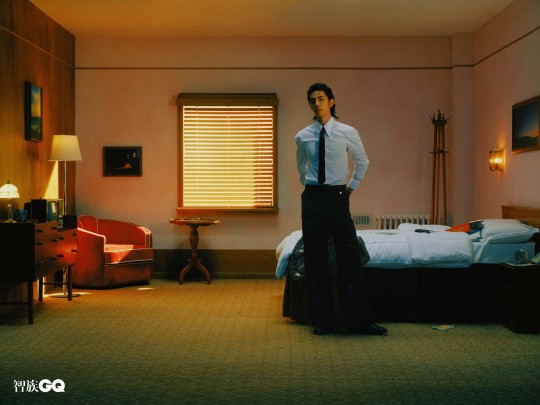
On acting
GQ: When did you decide you wanted to be an actor?
XZ: When the public began to pay more and more attention to me, I thought, why not me? I feel like I can do it.
Sometimes I'd waver and think, it's so difficult, why can't I do it properly? For example, with dialogue. Why isn't my delivery good enough, why can't I compete with others? Just because I'm a Southerner? I doubt it. Then I'd think, how can I improve? I can do it, let's just try.
GQ: In your opinion, what is the professional standard required of an actor?
XZ: Firstly, you have to master the craft. This is inescapable, you might not be from a professionally trained background, but you have to have the ability. That's what I want to achieve, and it's also what I'm currently working on. I'm not there yet, there's still some way to go.
After that, attitude is very important, as is whether you're passionate about it. Only seeing it as a job is entirely different from really being in love with it. If you only see it as a job, you might not be able to take it very far. But if you're passionate about it, it'll make you cry, and laugh, and may become the force that allows you to carry on.
And a strong physique (laughs), when I was in my twenties it was fine, now if I do an all-nighter I get really tired. That's the terrible truth. Being physically strong is really important, that's your foundation.
GQ: Which part or show made you feel you had earned approval?
XZ: The earliest was during The Wolf, I was under a lot of pressure then, my acting coach gave me lots of suggestions and guidance, and every single day I'd end up changing the way I did it. I was lost. After getting through that, I realised I'd grown from the experience, and was gradually getting the hang of it, and from then on I've gone on bit by bit. It's a cumulative process.
I feel like I haven't done enough, compared to some of my seniors. When they were in their 30s they already had tons of credits. I still don't have enough work out, I haven't accumulated enough.
GQ: Do you feel a sense of urgency?
XZ: Yeah, because I think (improvement) is a process of accumulation. It's impossible to make a giant leap with one show, that's unlikely for me. So I have to keep acting nonstop, but they have to be high quality works, rather than just wasting myself.
GQ: What were the considerations behind having three shows broadcast in 2023 that ranged from guzhuang to period drama to contemporary urban drama?
XZ: Actually there wasn't much consideration, it happened naturally. I don't deliberately avoid genres I've already done, it all depends on the script. Whatever script I get given, if I'm drawn to it, I'll choose it, it's just a coincidence that it was all material I hadn't done before.
GQ: Would you get tired of doing guzhuang all the time?
XZ: Guzhuang has many sub-genres. There's no real distinction between guzhuang and modern dramas - it's just putting on a wig and a different set of clothes, the core is the same, the only difference is the outer layer.
GQ: Do you follow your shows as they air?
XZ: Not on a daily basis, but I do watch. I'll pick out the scenes I particularly care about and pay special attention to those, as a way of critiquing my own work.
GQ: Do you have the audience commentary on?
XZ: I used to, it was fun to laugh along with everyone else, but these days I won't.
GQ: What kind of role do you want to play now?
XZ: If I can choose, of course I'd love to try something I haven't done yet. I need a sense of novelty - if you had to do the same thing every day, you'd get sick of it too.
GQ: What kind of actor do you want to be?
XZ: The kind that the audience likes.
GQ: Haven't you already achieved "being liked"?
XZ: No, no, not nearly enough. I thought about whether I wanted to be the kind of actor known for their unique characteristics, or one that an audience is instantly drawn to. At the moment I want to be an actor the audience is fond of. They might not be fans of yours, or even feel very positive toward you, but when they know you have a show on, they think, maybe I should check it out, his shows are all pretty good. That’s what I want, that’s my current goal. Whether I can reach the level of the actors I admire, that’s a long road, I’m going to take my time.
GQ: Who are the actors you like?
XZ: There are many, for example Zhou Xun has always been an actor I really like. I watched her most recent movie (Across the Furious Sea), it's brilliant.
GQ: What career plans do you have for 2024?
On life
XZ: Make more shows, work with more good people, that’s the current goal. I’m not thinking about the rest right now.

GQ: Does social media noise bother you?
XZ: It doesn't. If I still let it get to me after all this time, what kind of life would I live? (laughs) It's really not a big deal. So long as I'm clear about what I'm doing, it's fine. Every time you make a choice, you have to have a clear understanding of what you're doing, what you have to give up, and what you want to achieve. So it's fine. It's probably more of a bother for my crew.
GQ: Has it not affected your private life?
XZ: I live an extremely normal life. I can go for a bike ride or a walk. When you're on the street, no one actually cares who you are. It's really not like you imagine, I can walk around freely.
GQ: Is this kind of time an escape for you?
XZ: More a time to relax. Why would I need to escape? I live in this world too, where would I escape to? This is my life, I live it just the same as everyone else. There are so many things I really want to do, like take the crowded subway, wander around a mall, like I used to when I was a student. Maybe I will.
GQ: Do you miss the life of an ordinary person?
On personality
XZ: I don't miss it. I just think that's what I should do, being grounded. I really will get on a crowded subway car, maybe tomorrow, that's just normal. I used to do it every day. There's really not much I can't do. What are you going to do if you see me? We'd say hi and then be on our way. I just don't want to create disturbances, make trouble, or cause any negative repercussions.
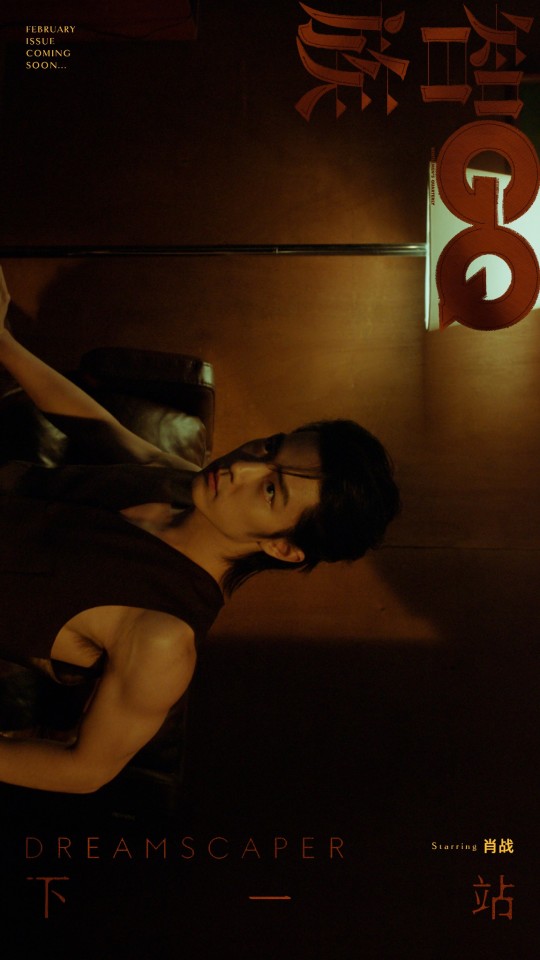
GQ: You haven't been on any variety shows the past few years. Was that a deliberate choice?
XZ: It's because I'm not a good fit for it. With my personality, variety shows are too much. I'd constantly be trying to take care of everyone else's feelings, it would be really tiring. Since I know that's what it would be like, it's better not to do it at all.
GQ: What did you initially enter the industry for?
XZ: Honestly, I stumbled my way in totally inexplicably with no idea of what I was doing. I used to watch interviews with contestants who had placed high on survival shows, and they'd ask, how did you get here? The contestant would say, I came to the audition to keep my friend company, but my friend didn't get through and I did. When I was a kid, that kind of thing seemed very far away, but it really happened to me. Pretty wild. I entered a survival show, and now we're here. That's it. Life really is very strange and marvelous.
GQ: What's something about the industry you couldn't have thought of?
XZ: Not being able to eat whatever I want is really cruel. When I saw that one of my high school classmates had a kid already and had let themselves go a bit, I'd sigh - I want to eat freely like that too. Their lives make me think that if I hadn't chosen this road back then, maybe I'd be the same, constantly having to attend work functions, pulling all-nighters to get designs done. You can't imagine how rough it is in the graphic design industry, but that's just life, there's nothing to be done about it.
GQ: How has choosing this path changed you?
XZ: I probably have a lot less life experience. My classmates have all far surpassed me in this respect. All their experiences are of actual events, with no cameras on them, no lights, just their real life.
GQ: Are you an emotionally stable person?
XZ: Re-la-ti-ve-ly stable. But I become very unstable when something impacts my bottom line.
GQ: Like what?
XZ: That is...I can't say, haha. Like when something inexplicable happens, I'd feel like, what are you doing? Or when something a normal person wouldn't do happens, I'd get really pissed. Like privacy issues. Once it breaches my bottom line, I go nuts. Everyone has their own boundaries. Some people don't have a good sense of propriety, and I stay far away from them. But if someone pushes against my boundaries over and over and it violates my bottom line, I get very angry.
GQ: You once said that you have a very staunch side. What were you referring to?
XZ: Principle. I'm a very stubborn person, if I insist on something, if I think it's right, then it's very hard to convince me otherwise.
For example, I want to be an actor. I don't want to do anything other than acting. If you try to force me, then let’s have the debate. There’s no such thing as right and wrong, my crew are only looking out for me, isn’t it positive to have so much work? But for me, I need to simplify my life. Because there are some things I definitely don’t want.
GQ: Do you have a perfectionist side?
XZ: I just want to do it well, to the best of my ability. Maybe the result won't be ideal, but what's to be done about that? I can only do that much.
GQ: Can you accept failure?
XZ: I can. A few years ago, maybe I couldn't. But the 32 year old Xiao Zhan has learned to accept it (laugh).
26 notes
·
View notes
Note
Just thinking after you mentioned a Yugioh is about Identity meta. Even after it's pretty clear Atem/Yami is NOT actually a split personality of Yugi's, he still calls him 'other me'. Do you think that means YUGi himself has identity issues, perhaps pertaining to lacking confidence compared to Atem?
Okay so the original ygo-identity meta is here and the most straightforward basis of it is that ygo says that stealing or erasing someone else's identity for your own use is bad. This is most obviously displayed by Yami Bakura, the big bad, and his sinister parasitism; but it's also laid out by Yami Marik, whose intent to inhabit Marik's life in his place is a more direct act of violence, and more subtly by Gozaburo's partially-successful attempt to reshape Kaiba in his own image, and a few other smaller places. It is wrong, says ygo, to put yourself in someone else's place, to replace what is "them" with what is "you," to blur those lines.
This is, of course, what Atem spends the entire series doing, and I've written a thousand posts about how he knows what he's doing and feels horrifically guilty about it; this is why the climax of YGO is Atem getting his own name and learning his own history, because it is when the identity theft stops. When Atem says no, I am a different person, I was never you, and from now on I am going to be only myself. This is when he finally triumphs over evil, and the evil he's triumphing over is very specifically his contrast with Yami Bakura, who has not only spent the entire series identity-thefting Bakura but has had his own original identity as Thief King already erased, used, and discarded by Zork.
The question of "How does Yugi fit into all this?" is like. A chewy one.
Yugi's presence marks the biggest difference between Atem and every other parasite in this story. Yugi consents. Yugi says "You want to use my identity? You can have it, then. I will share. I will let you have everything."
I think there's a reading of ygo that goes "Ah! That's the difference, then. Yugi consents, which is what makes everything fine!" which isn't implausible, really, but it's not one I buy. The ultimate message is still that Atem can't triumph over evil until he knows that he is himself, and that Yugi can't become the king of games until he separates Atem from himself. Atem's "borrowing" of Yugi's identity, even if consensual and pleasant, is condemned by the narrative as unsustainable. Per the last two arcs, while their bond is everything and they may save each other, Atem cannot be Yugi because Atem is Atem, and this saves the world; Atem cannot be Yugi because there cannot be two Yugis, because Yugi has to be strong enough to fight for himself.
Then we get to, okay, but why does Yugi consent? And why does the narrative still insist they be separated, if it looks like a positive relationship for both parties?
On a higher narrative level, I think Yugi's cheerful willingness to have someone else stand in his shoes is just another example of the forms possession takes in this universe. The Mariks want to kill each other, YB takes more of a simmering slow-roll that victimizes Bakura more over time, and Atem and Yugi are apparently happy codependent symbiotes. It helps cover our bases and presents an example where identity theft can be done willingly but still be ultimately unhealthy.
On a character level, it brings us back to the themes and character notes introduced in the very earliest chapters of the manga: Yugi Muto has poor self-esteem and poor self-preservation; he is so lonely he thinks his bullies are his friends; he is bottomlessly kind to others and has a deep-set sense of justice; he feels powerless to fight back against those who harm him or his friends; he has trouble handling his negative emotions--rage, grief, loneliness--almost certainly in part exactly because of how powerless he feels to act on them.
Yugi’s defining introductory character moment is, remember, throwing himself in front of Jou and Honda, two people who have been nothing but cruel to him, in order to protect them from someone even crueler and meaner, and getting the shit kicked out of him. It does not shock me that Yugi would offer Atem everything he has. Yugi is kind, even at his own expense. If he thinks that to share his very personhood is what Atem needs, then he will give it.
Letting Atem temporarily Be Him appears to solve a lot of his problems. “Other Yugi” can act on his rage; he is cool and powerful and liked; he can dole out justice and protect the people he loves. At the end of the day he can go home content that “Yugi” has accomplished everything he wanted to. Letting someone else do all the hard parts of your life, is, obviously, detrimental, but it’s a very passive, comfortable detrimental. It hits hard against your self-actualization and sense of accomplishment in the long-run, but it feels pretty great at the time. It is burying your issues with yourself the same way he buried all the feelings he didn’t want to deal with for so long that Atem ended up setting a bunch of people on fire with them.
So Yugi’s bottomless kindness combines with Atem’s desperate need to cling to a sense of identity. Yugi throws a band-aid on all his issues and eagerly says okay, you need it, you can have mine.
I wouldn’t say Yugi has “identity” issues, not in the same way Atem does. Yugi has, and always has had, ignore-his-problems-and-sweep-everything-under-the-rug issues. Yugi knows who he is. I think on some level he understands that Atem is not and never was him. But acknowledging that Atem is not him is admitting everything that got us here in the first place--that Yugi Muto, the one and only, isn’t cool and isn’t powerful. That none of those accomplishments are his. That Yugi Muto is small and weak, that he can’t hurt back all the people who hurt him, that he can’t make friends or get a date on his own. This is terrifying and difficult to think about, so he won’t. Atem is lost and confused and won’t assert himself as separate, so Yugi never has to.
It suits Yugi’s self-esteem to let everyone think Atem is him, and it suits Atem’s sense of purpose to pretend he is Yugi, and neither of them has to deal with the mortifying ordeal of being themselves. They will continue in this ouroboros of projection, enablement, and self-abjuration until the last two arcs force them to stop. And it will--because YGO is about identity; because Yugi and Atem’s cohabitation prevents either of them from fully asserting an individual identity. Because the narrative of YGO insists, demands, that the only way forward is to be yourself and nobody else.
602 notes
·
View notes
Text
DA2: Things I've Noticed Prt 1/?
I've been replaying Dragon Age 2 just to explore and also play through some routes I haven't done before. Got my first rogue Hawke and I'm planning on romancing Anders because I haven't romanced him yet.
But this is more of just cataloguing things I've noticed throughout my playthrough:
Bethany starts off with a staff that deals cold damage.
Worthy, the rune crafting dwarf has what appears to be a hunk of red lyrium on his crafting table in Act 1. Before you even go down into the Deep Roads. This is also found in the Black Emporium.
When you talk to the Expedition Hirelings next to Bartrand one of them mentions that the Expedition is planned to be 2 weeks long.
When entering the Chantry, Sister Lorena and Sister Samea will speak of Fereldan orphans in Darktown.
Sister Lorena: Those children! The orphaned Fereldans ran off again after we fed them.
Sister Samea: I wish they'd let us help them. It'd be better than scraping by on the streets in Darktown.
This paired with dialogue from Sebastian paints the picture that not only does the Chantry go out of its way to "help" in some way, but if they do help you they fully expect you to become part of and work for the Chantry.
Sebastian: (In Darktown) Why do these people not come to the Chantry? The brothers and sisters would find a place for them.
Sebastian: (In Darktown) So many souls waiting to be brought to the light.
When you go to the Hanged Man, there is a "Talkative Man" who speaks of a conspiracy theory that there are more mages due to lyrium being put in the water. (Which is likely a joking reference but Mm. Opinions.)
In the Black Emporium, you find the Andraste in Nude Repose - Invisible codex. Where it speaks of how enchanters were tasked with extending what we know to be the veil, to hide Andraste's nude form. To tuck her away in a sense, into the Fade. Which implies some heavy veil muckery that might be on par with some old magic we’re vaguely aware of. Given it has lasted ages.
The eluvian used for the mirror of transformation is a reused asset of Merrill's eluvian but it has chunks of red lyrium coming out. This was redesigned in Inquisition to be a simplified and universal eluvian.
Aveline and Varric both acknowledge that most people in Lowtown or are crimnals/thieves can't read. Adding onto the fact established in Asunder that most of the common folk rely on pictures.
To add onto that, based on set building there are books in the kitchen which implies that at least a level of literacy might be had with at the very least the lead cooks. To follow recipes, inventory, ect.
There are peticoats, frocks, and other historical clothing referred to by Gamlen and Bethany when speaking of clothing.
Leandra doesn't have a single child who isn't self-loathing unless the player doesn't choose those options. Bethany seems to deal with more of the emotional dumping/guilt than Carver does. Which is... Yeah, I got thoughts.
When you first meet Anders, you have the first accusation that Merideth and her templars are abusing their power (If you haven't gone to the gallows yet, which at the time I hadn't.) The example is that they are turning over a dozen mages tranquil in 9:31, presumably this is happening in late summer/early autumn given Awakening considerations. So it's been almost a year, August at the earliest; and they've already exceeded more than one tranquil a month.
Anders has surgical tables with a slit to help with drainage and a gutter that empties into a vessel. Which is neat in consideration to what we know of their medical status.
#dragon age 2#da2#Archi explores Kirkwall#Kirkwall shenanigans#anders#varric tethras#varric#sebastian#sebastian vael#lyrium#black emporium#kirkwall#chantry#sister lorena#sister samea
139 notes
·
View notes